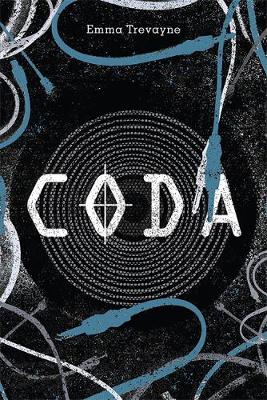
Jo
Written on Jan 11, 2013
Coda was first brought to my attention when I was talking about LGBTQ YA Month on Twitter and seeing if any authors would be interested in contributing. Someone flagged up Emma Trevayne and her novel, and after speaking to her, I knew Coda was a book I had to read. I didn't expect it to be just as fantastic as it was!
Because of the way Coda is written, I'm going to review the book as a whole first, and then discuss the LGBTQ aspects after. So, the story. Music is dangerous. Controlled and encoded by the government, the Corp, all music is a drug; aural drugs that it is compulsory to listen to. The Corp wants its citizens addicted, and if it find a citizen isn't tracking - listening to music on their home music consoles or at the clubs - often enough, guards are sent to encourage them to do so. Middle aged becomes "old" when addiction causes so much damage to the brain that people end up sitting on sofas with the desire only to keep tracking and sleeping until they're dead. This is the world Citizen N4003 - or Anthem, as he calls himself - lives in. A world he hates. But he has a love for real, true unencoded music that he plays with his underground band. If they're found out, they're all dead. Anthem lives in constant worry of what will become of his nine-year-old twin siblings, Alpha and Omega, and his constantly high father, who won't last that much longer, if he's ever caught. But the music is in his blood, it's what keeps him going in the world he despises, and can't give it up. When a friend and band mate dies mysteriously whilst tracking, Anthem and his band decide it's time to make a stand, to show the world what real music is and to fight back against the Corp. But the Corp has secrets and plans far worse than anything he could imagine. Are they really strong enough to win this fight?
Coda is one of the most amazing dystopian novels I have ever read. Why? Because I'm pretty sure it's the most disturbing. The arrogance and malevolence of the manipulative Corp is unbelievable. This is a dystopian novel, so certain aspects are expected, but what's not expected is how the Corp goes about things. There are moments when the Corp is honest about what's going to happen, because they know there is no way anything can be done to stop it, and it's just shocking. There's no sugar-coating and making things seem less than they are. Its honesty told with smug satisfaction and enjoyment over Anthem's reactions. They exude power and hold the lives of everyone in the palm of their hands. One small misstep, and that hand will crush. They are absolutely terrifying.
The story of Coda is told in a style I've never really come across before. It's very much a "show, don't tell" story, in that things are never really explained - there's no pause in the story to explain to the reader how things work, or why things are as they are. At first this is a little confusing, because I didn't really understand certain things, but now having read the story, those things were small in relation to the whole story, and as the story progresses, you know exactly all the why's and how's of pretty much everything by witnessing it, rather than being told. It was very different, but refreshing way to read, discovering and understanding as you go, rather than having all the information passed to you on a plate. I think I might actually prefer it. There were a few things I did have a little bit of a problem with, but I think that's more to do with me rather than the story of Trevayne's writing. There were some of the techy aspects I had some trouble getting my head round at. Because technology and I aren't the most intimate of friends, there's one how I never really understood - how the music actually affected people. It's encoded, but people aren't machines. It has something to do with the chips everyone has in their bodies, but I didn't quite get how that would cause a physical reaction, and cause physical damage to the brain. As I said, this is just me, and it is something that's covered through the "show, don't tell" writing style, it's just something I never completely understood. I just accepted that music did have the effect it does, and it didn't spoil the rest of my enjoyment of the story.
Coda has a cast of brilliant characters, all of who play their own role - no one person who is given a name is unimportant - and they're all so varied and so real. But it's Anthem that shines, because he's so human. He's not all "we're going to fight, and we're going to win!" He's unsure, he has doubts about what they can do, he doubts his own abilities, he worries about what his actions will mean for other people and so really thinks and considers a lot. He is all for change, but he's also full of despair about the world his little brother and sister are living in, and what they may end up living in if he fails. His love for others is brilliant, he cares so little about what happens to himself, but so much about others that it's them he tries to be certain of things for, as their lives are at as much risk as his own. Anthem's a fantastic character, and one you can't help but warm to.
And now the LGBTQ aspects of the book. Anthem is bisexual. His sexuality isn't any kind of deal in regards to the story of fighting against the Corp. This isn't a book about a bisexual teen, it's a book about a teen who just happens to be bisexual. Yet his sexuality isn't included in the story as an afterthought; it may not be important to the story as a whole, but it's important to the character of Anthem. It doesn't define him, but it's a big part of who Anthem is, his past and present, and has a part to play with his relationships with people. Scope, one of his best mates, is someone he has been mates with since they were children. They were also a couple. Their relationship as friends and their relationship as a couple have brought a closeness between the two that is beautiful to see and needed at certain points. Who better to rely on than someone who knows all there is to know about you? It also affects his relationship with Yellow Guy, Scope's boyfriend. Yellow Guy knows they used to go out, and that they're still close, and shows his jealousy whenever something is said or happens between Scope and Anthem that a naturally jealous person would automatically not be too happy about.
Another thing to mention is that although the world of Coda is just so wrong, it is a world where sexuality isn't a big deal. Nobody thinks anything of it; the world has progressed to the point where homophobia doesn't exist. There is a point where someone tells Anthem that she asked a woman to talk to him as she thought he might like some "company", but she can arrange it if he would prefer a man. She doesn't bat an eyelid at the idea of him being bisexual. Although sexuality isn't something to even spare a second thought on, it's still a world where you would like your private life kept private; Anthem doesn't like that this woman has been made aware of his sexuality when it's none of her business.
Coda is a simply incredible dystopian novel, and a completely wonderful debut! It could be read as a standalone, but I'm pleased to say a there is to be a sequel, Chorus! A fantastic story, and one that deserves to have huge buzz surrounding it! If you only read one debut novel this year, this is the one to read!
Thank you to Running Press UK for sending me a proof copy.
